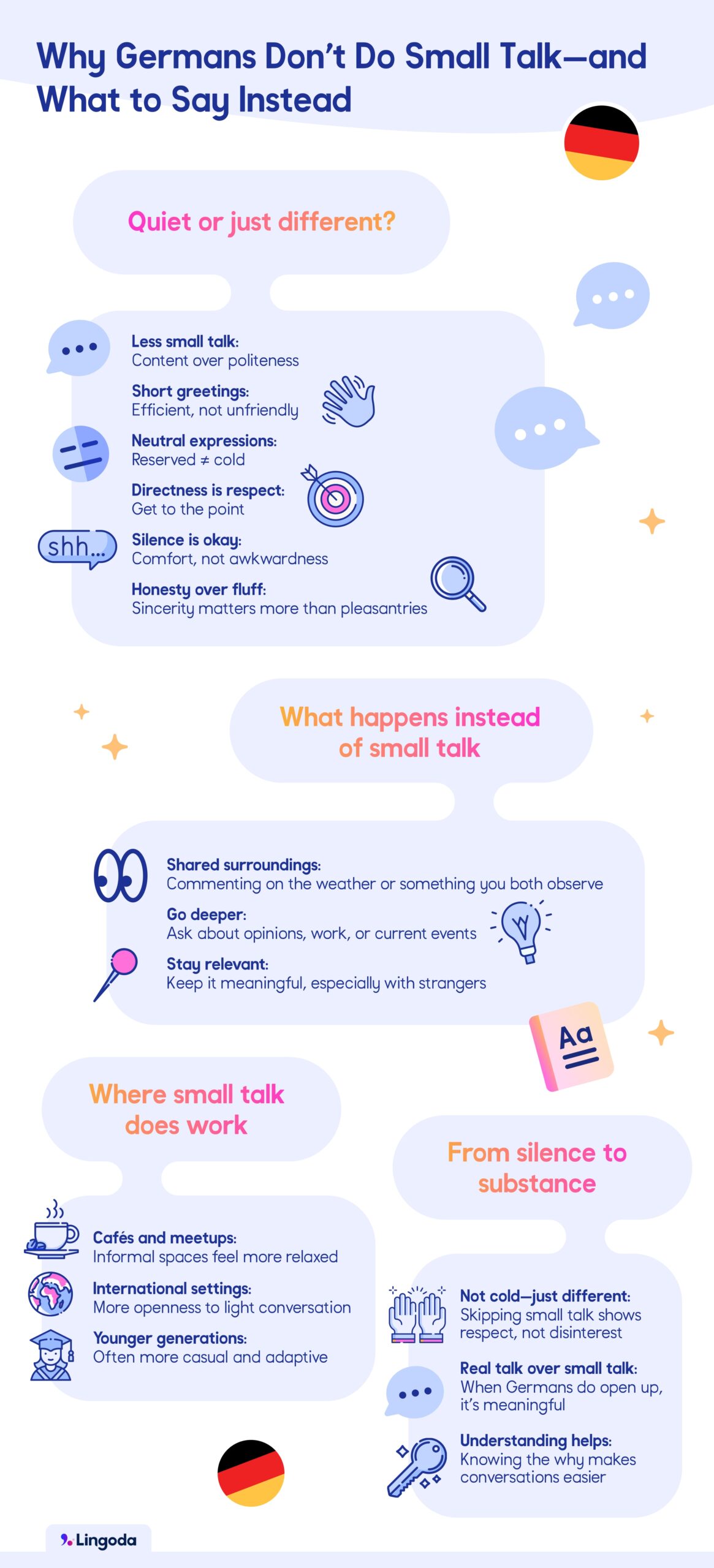Why Germans skip small talk, and how to connect without it

“Hello, how are you?” For many, it’s an effortless icebreaker. But in Germany? Expect a blank stare or a brutally honest answer. While such a response can feel awkward or even rude to newcomers, skipping small talk isn’t considered disrespectful in Germany at all. Directness and efficiency are values deeply embedded in German culture. As intercultural expert Erin Meyer puts it: “In Germany, saying exactly what you mean isn’t considered rude — it’s considered respectful. Clarity is kindness.”
But that doesn’t mean there aren’t other ways to connect. Let’s explore the reasons behind Germans’ aversion to small talk and learn how to avoid any initial awkwardness by navigating conversations in Germany differently.
What small talk means (and why Germans avoid it)
If you’re from the US, UK or Latin America, you probably understand small talk as a means to show friendliness and connection. So, you might be baffled to learn that a conversation starter like “How are you?” is more than a simple form of greeting in Germany. Say these three words to a German, and you’ll likely be met with a very detailed account of their life’s joys and problems.
As this Reddit thread shows, many Germans view small talk as unnecessary because it “slows things down” : “I mean, in a German store, I wouldn't even find the time [for small talk] because I'm so busy taking things off the till.”
At the same time, being polite is highly valued in German culture. It’s just that being polite doesn’t mean exchanging friendly platitudes. A German would find it more “polite” to value the time of others and skip the unnecessary pleasantries. Consequently, the polite thing to do in the supermarket checkout line is to skip the small talk, get your groceries as quickly as possible and make space for the next person in line.
This reserved style isn’t necessarily cold or rude. It reflects deep cultural values: privacy, efficiency and a focus on meaningful content. Many Germans prefer getting to the point, especially with strangers or in formal settings. Once trust is built, conversations tend to be more open and often more substantial.
The role of directness and efficiency in German culture
German communication is typically direct and purposeful. Rather than engaging in small talk, many Germans prefer getting to the point. If you’re accustomed to a different style of communication, it can be difficult not to mistake silence or short answers for rudeness. Try to catch yourself and remember that they’re doing this out of respect for your time and theirs.
For many Germans, conversations without clear meaning can feel inefficient or even insincere. What might seem blunt in other cultures is often valued in Germany as honest and trustworthy. Silence isn’t awkward; on the contrary, it’s often more comfortable than speaking without a reason.

What happens instead of small talk in Germany
So, what’s it really like to visit the supermarket or meet with a new group of people in Germany? Is it a socially awkward exercise in utter silence? Not really.
In Germany, small talk is often replaced by brief, practical exchanges. A simple “Hallo” or “Guten Tag” is usually enough. Talking about the weather is acceptable, but conversations often move quickly to the main topic, especially in business settings.
Meetings start on time, with a clear agenda. Neighbors might greet each other politely without further chat. Even at parties, people tend to skip the small talk and dive straight into meaningful discussions. It’s not cold; it’s just a different way of connecting.
Beyond small talk: What Germans often prefer
Small talk isn’t always the go-to in Germany, but that doesn’t mean people don’t want to talk. In many cases, they just prefer conversations with a bit more depth. Instead of “How are you?”, try asking about someone’s work, their opinion on a local event, or their experience with something topical.
Commenting on something in your shared environment (like the weather, a queue or something you’re both observing) can also be helpful. As long as your interest is genuine, the connection will follow.
When small talk does work in Germany — and where to try it
Small talk isn’t always off the table in Germany. It just depends on the context. Keep in mind that we’re not talking about every person in Germany. There are many ways to approach communication.
Younger people, international crowds and people congregating in informal settings (like cafés, hobby meetups or language exchanges) often feel more relaxed. In these spaces, a quick “How’s your day been?” is totally fine. The key is reading the room: if people are smiling, chatting casually or making eye contact, chances are they’re open to a light conversation. Just don’t push it, and remember to let things develop naturally.
Final thoughts: From silence to substance
So, is skipping small talk a sign of coldness? Not really. In Germany, it often signals something else entirely: a preference for substance over surface, and a respect for your time and privacy. Once you start to see it as a cultural norm rather than as a sign of awkwardness, communication becomes easier to navigate.
Understanding these differences will save you from confusion in the checkout line, sure, but it will also help you connect with Germans on a deeper level. German conversations may not start with friendly fluff, but when they do open up, they tend to be honest, thoughtful and meaningful.













